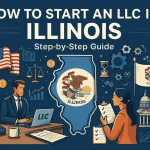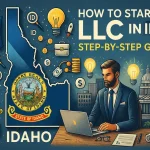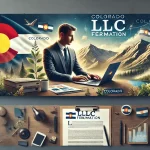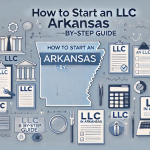Looking to start an LLC in 2025? LLC Tutor offers a comprehensive, easy-to-follow guide for entrepreneurs. Learn step-by-step how to form your Limited Liability Company, understand legal requirements, and protect your business assets with expert tips and practical advice.
What is an LLC?
An LLC (Limited Liability Company) is a legal structure for your business that combines the benefits of both corporations and partnerships. It protects your personal assets (like your home and car) from business debts and lawsuits, while offering flexibility in taxation and management. Forming an LLC is often the best choice for small business owners, freelancers, and entrepreneurs.
Why Should You Start an LLC in 2025?
Starting an LLC in 2025 offers several advantages:
- Limited Liability Protection: Personal assets are protected from business liabilities.
- Tax Flexibility: Choose from various tax options, including pass-through taxation.
- Credibility: An LLC shows professionalism and instills trust with customers and partners.
- Minimal Compliance: LLCs have fewer formalities than corporations.
How to Start an LLC: Step-by-Step Guide for 2025
Starting an LLC might seem complicated, but with the right guidance, it’s an easy process. Follow these 6 simple steps to get your LLC up and running:
1. Choose Your LLC Name
Choosing the right name is crucial for your LLC. Your business name must be unique and comply with your state’s LLC naming requirements. It should include the words “Limited Liability Company” or “LLC” to distinguish it from other business entities.
- Pro Tip: Check for domain name availability to match your LLC name, ensuring a consistent online presence.
- Use tools like Namechk to verify name availability across platforms.
2. Designate a Registered Agent
A Registered Agent is someone who will receive official legal and tax documents on behalf of your LLC. This person or service must have a physical address in the state where your LLC is registered.
- Pro Tip: Many LLC owners choose professional Registered Agent services to ensure compliance with legal requirements.
- Find the Best Registered Agents for Starting an LLC
3. File Your Articles of Organization
To officially form your LLC, you need to file Articles of Organization (also known as Certificate of Formation or Certificate of Organization) with your state’s Secretary of State office. This document includes basic information about your LLC, such as:
- LLC name
- Registered Agent details
- LLC address
- Purpose of your business
Filing Fees: Fees vary by state, generally ranging from $50 to $500.
4. Create an LLC Operating Agreement
An Operating Agreement is a crucial internal document that outlines how your LLC will operate. It defines the ownership, member roles, and procedures for running the business. While it’s not required in all states, it’s highly recommended for LLCs with multiple members.
- Pro Tip: Even if your state doesn’t require one, having an Operating Agreement helps prevent conflicts and clarifies decision-making procedures.
5. Apply for an EIN (Employer Identification Number)
An EIN (also known as a Federal Tax Identification Number) is necessary for tax purposes, opening a business bank account, and hiring employees. You can apply for an EIN for free through the IRS website.
- Pro Tip: An EIN is essential if you plan to hire employees or want to avoid using your personal Social Security Number for business activities.
6. Comply with State and Local Requirements
Depending on your location and business type, you may need to obtain specific licenses and permits to operate legally. These vary by state, county, and industry. Common requirements include:
- Sales Tax Permit: If you sell goods or services.
- Health Department Permit: For businesses in the food industry.
- Professional Licenses: If your business is in fields like real estate, accounting, or law.
Pro Tip: Check your state’s business website for a list of required licenses and permits specific to your business type.
LLC Taxes in 2025: What You Need to Know
LLCs offer flexibility when it comes to taxes. By default, LLCs are treated as pass-through entities. This means that profits and losses pass through to the owners’ personal tax returns, avoiding double taxation.
However, LLCs can choose to be taxed as an S Corporation or C Corporation if it benefits the business financially.
- Pro Tip: Consult with a tax professional to determine the best tax classification for your LLC, especially if you expect substantial earnings.
Common Mistakes to Avoid When Starting an LLC in 2025
- Choosing an Unavailable LLC Name: Always verify the availability of your business name in your state’s business registry and online.
- Neglecting State-Specific Requirements: Different states have different regulations and fees—be sure to check local laws.
- Mixing Personal and Business Finances: Keep your personal and business accounts separate to maintain your LLC’s liability protection.
Maintaining Your LLC in 2025
Once your LLC is formed, you must stay compliant with state and federal regulations. This includes:
- Filing Annual Reports: Some states require LLCs to file annual reports and pay annual fees.
- Paying State-Specific Taxes: Be aware of taxes that may apply, including state income taxes, franchise taxes, or gross receipts taxes.
- Maintaining Accurate Records: Keep detailed financial and business records for tax purposes and compliance.
Conclusion: Start Your LLC in 2025 and Secure Your Business Future
Starting an LLC in 2025 is a smart way to protect your personal assets and build a strong business foundation. By following these simple steps, you can form your LLC and focus on growing your business with peace of mind.
At LLC Tutor, we’re here to help you through every step of your LLC journey. Whether you’re forming your LLC for the first time or need advice on compliance, our expert guides and resources are available to ensure your success.















Thank you for reading our comprehensive guide on starting an LLC in 2025! We hope this step-by-step approach has made the process easier to understand. If you have any questions or need further assistance, feel free to leave a comment below or reach out to us directly. We’re here to help you on your LLC journey!